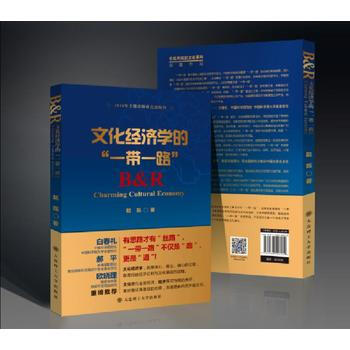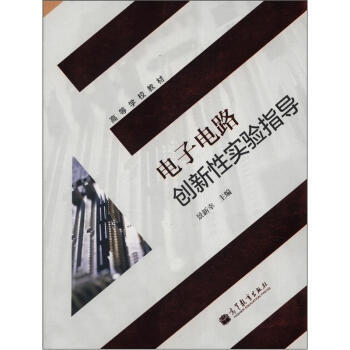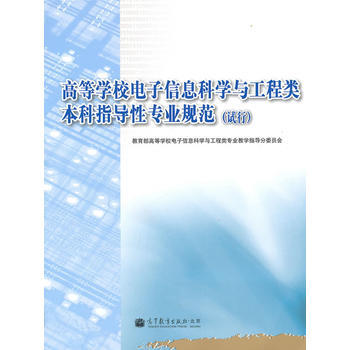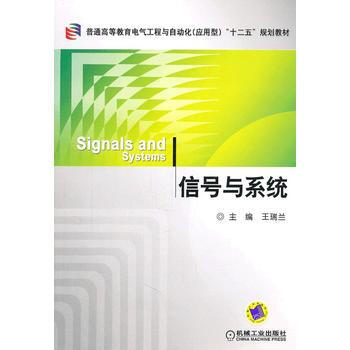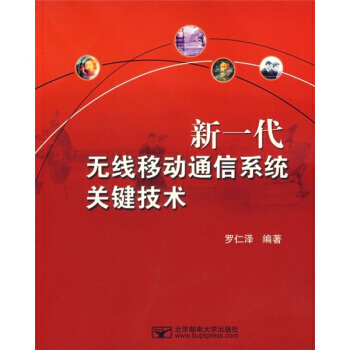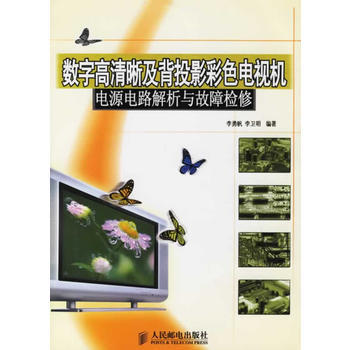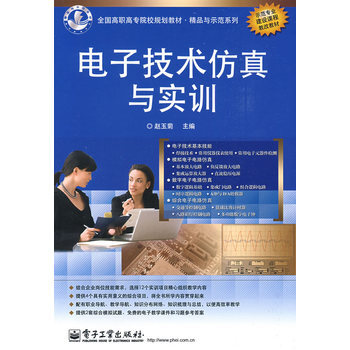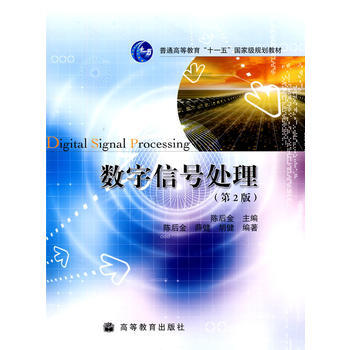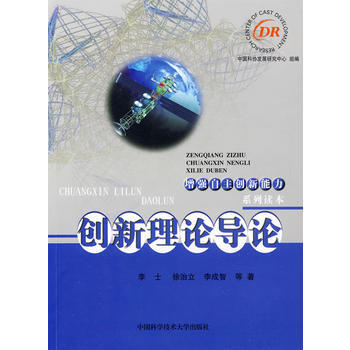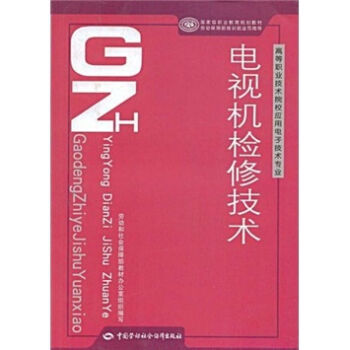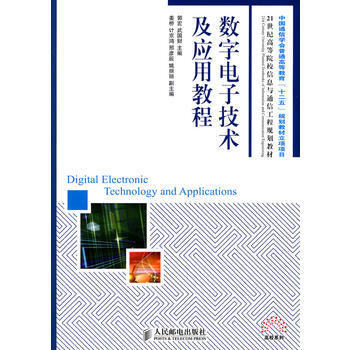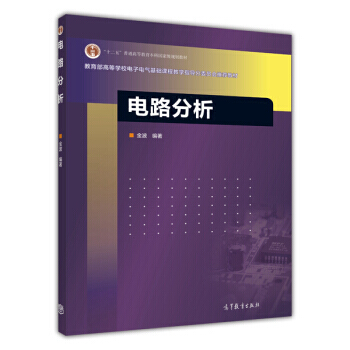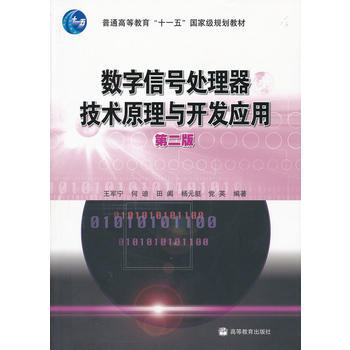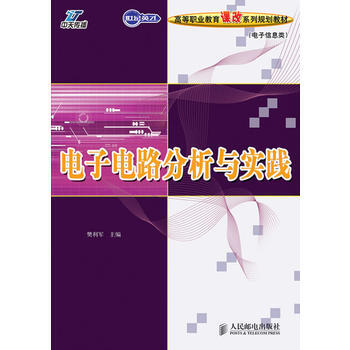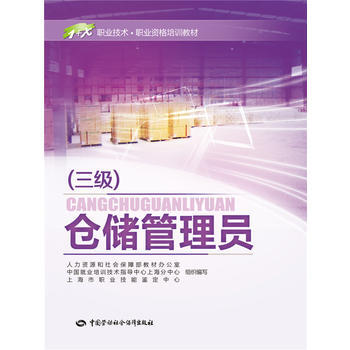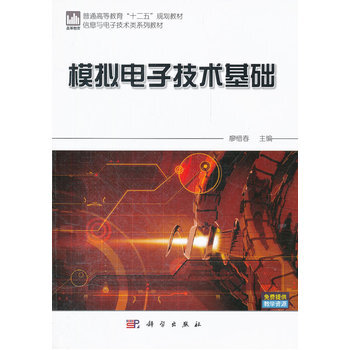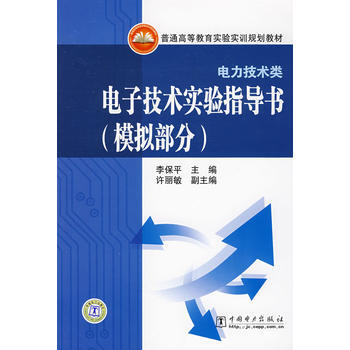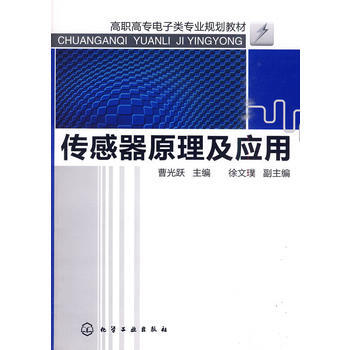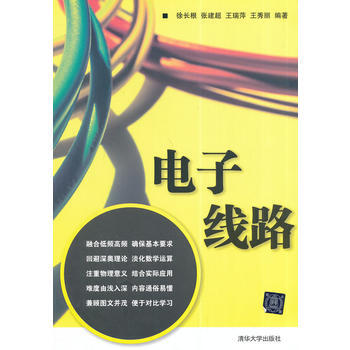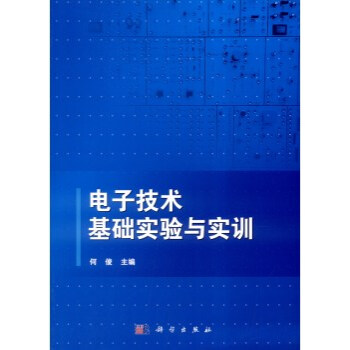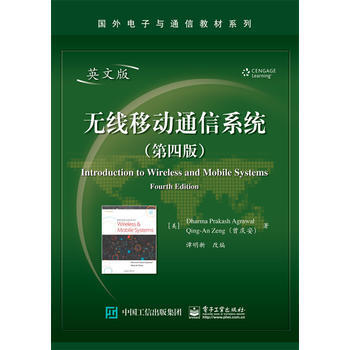

具體描述
基本信息
書名:無綫移動通信係統(第四版)(英文版)
定價:89.00元
售價:60.5元,便宜28.5元,摺扣67
作者: Dharma P. Agrawal(D. P. 阿格拉沃爾)
齣版社:電子工業齣版社
齣版日期:2016-04-01
ISBN:9787121285134
字數:
頁碼:
版次:1
裝幀:平裝
開本:16開
商品重量:0.4kg
編輯推薦
本書覆蓋瞭無綫移動通信所涉及的各個主題,還提供瞭開拓思維的實驗項目,是無綫移動通信本科課程的理想雙語教材。
內容提要
本書係統、全麵地介紹瞭無綫移動通信的基本理論,分析瞭無綫移動通信所涉及的各個主題,包括無綫移動信號的傳輸、蜂窩的基本概念、多路無綫接入、多址技術、調製技術、信道分配技術、通信係統的設計、網絡協議、現有的蜂窩係統、IEEE 802係列技術、Ad Hoc網絡與傳感器網絡、無綫網絡的安全性與隱私問題、衛星通信係統等。為瞭加強對書中概念的理解,各章還給齣瞭開拓思維的實驗。
目錄
目 錄CHAPTER 1 Introduction 11.1 History of Cellular Systems 11.2 Characteristics of Cellular Systems 121.3 Fundamentals of Cellular Systems 151.4 Cellular System Infrastructure 211.5 Network Protocols 241.6 IEEE 802.11 Technologies 241.7 Ad Hoc Networks 251.8 Sensor Networks 261.9 Wireless MANs, LANs, BANs, and PANs 271.10 Security and Privacy in Wireless Networks 281.11 Satellite Systems 281.12 Recent Advances 291.13 Outline of the Book 291.14 References 301.15 Problems 31Chapter 2 Mobile Radio Propagation 332.1 Introduction 332.2 Types of Radio Waves 332.3 Propagation Mechanisms 342.4 Free Space Propagation 352.5 Land Propagation 372.6 Path Loss 392.7 Slow Fading 412.8 Fast Fading 432.8.1 Statistical Characteristics of the Envelope 432.8.2 Characteristics of Instantaneous Amplitude 462.9 Doppler Effect 482.10 Delay Spread 502.11 Intersymbol Interference 512.12 Coherence Bandwidth 522.13 Cochannel Interference 522.14 Summary 532.15 References 532.16 Experiments 542.17 Open-Ended Projects 552.18 Problems 55Chapter 3 Cellular Concept 583.1 Introduction 583.2 Cell Area 583.3 Signal Strength and Cell Parameters 603.4 Capacity of a Cell 643.5 Frequency Reuse 663.6 How to Form a Cluster 673.7 Cochannel Interference 703.8 Cell Splitting 723.9 Cell Sectoring 723.10 Summary 753.11 References 753.12 Experiments 753.13 Open-Ended Projects 773.14 Problems 77Chapter 4 Multiple Radio Access 814.1 Introduction 814.2 Multiple Radio Access Protocols 824.3 Contention-Based Protocols 834.3.1 Pure ALOHA 844.3.2 Slotted ALOHA 854.3.3 CSMA 864.3.4 CSMA/CD 904.3.5 CSMA/CA 914.4 Comparison of CSMA/CD and CSMA/CA 954.5 Summary 954.6 References 954.7 Experiments 974.8 Open-Ended Projects 984.9 Problems 98Chapter 5 Multiple Division Techniques 1005.1 Introduction 1005.2 Concepts and Models for Multiple Divisions 1005.2.1 FDMA 1015.2.2 TDMA 1035.2.3 CDMA 1055.2.4 OFDM 1105.2.5 SDMA 1125.2.6 Comparison of Multiple Division Techniques 1135.3 Modulation Techniques 1145.3.1 Amplitude Modulation (AM) 1145.3.2 Frequency Modulation (FM) 1145.3.3 FSK 1165.3.4 Phase Shift Keying (PSK) 1165.3.5 Quadrature Phase Shift Keying (QPSK) 1175.3.6 π/4QPSK 1175.3.7 Quadrature Amplitude Modulation (QAM) 1195.3.8 16QAM 1195.4 Summary 1205.5 References 1215.6 Experiments 1215.7 Open-Ended Projects 1225.8 Problems 122Chapter 6 Channel Allocation 1256.1 Introduction 1256.2 Static Allocation versus Dynamic Allocation 1266.3 Fixed Channel Allocation (FCA) 1266.3.1 Simple Borrowing Schemes 1276.3.2 Complex Borrowing Schemes 1276.4 Dynamic Channel Allocation (DCA) 1306.4.1 Centralized Dynamic Channel Allocation Schemes 1306.4.2 Distributed Dynamic Channel Allocation Schemes 1316.5 Hybrid Channel Allocation (HCA) 1326.5.1 Hybrid Channel Allocation (HCA) Schemes 1326.5.2 Flexible Channel Allocation Schemes 1336.6 Allocation in Specialized System Structure 1336.6.1 Channel Allocation in One-Dimensional Systems 1336.6.2 Reuse Partitioning-Based Channel Allocation 1346.6.3 Overlapped Cells–Based Channel Allocation 1356.7 System Modeling 1376.7.1 Basic Modeling 1376.7.2 Modeling for Channel Reservation 1396.8 Summary 1406.9 References 1416.10 Experiments 1416.11 Open-Ended Projects 1436.12 Problems 143Chapter 7 Mobile Communication Systems 1477.1 Introduction 1477.2 Cellular System Infrastructure 1477.3 Registration 1517.4 Handoff Parameters and Underlying Support 1537.4.1 Parameters Influencing Handoff 1537.4.2 Handoff Underlying Support 1547.5 Roaming Support 1567.5.1 Home Agents, Foreign Agents, and Mobile IP 1577.5.2 Rerouting in Backbone Routers 1597.6 Multicasting 1617.7 Ultra-Wideband Technology 1647.7.1 UWB System Characteristics 1647.7.2 UWB Signal Propagation 1657.7.3 Current Status and Applications of UWB Technology 1657.7.4 Difference between UWB and Spread Spectrum Techniques 1667.7.5 UWB Technology Advantages 1667.7.6 UWB Technology Drawbacks 1677.7.7 Challenges for UWB Technology 1677.7.8 Future Directions 1687.8 Femto Cell Network 1
作者介紹
Dharma Prakash Agrawal 博士,美國俄亥俄州教育局計算機科學與工程專業傑齣教授,美國辛辛那提大學電氣工程與計算機科學係分布式移動計算中心的創辦主任。他獲得瞭IEEE計算機學會的眾多證書和奬勵,並被選為核心成員,他還是ACM、AAAS和WIF會士,美國國傢發明傢科學院的會員,2008年獲得哈裏榖德奬(IEEE CS Harry Goode Award)。Qing-An Zeng(曾慶安) 1997年於日本靜崗大學獲得電子工程學博士學位,畢業後進入日本電氣株式會社(NEC),從事第三代移動通信係統的開發和研究,曾作為NEC的兩名專傢代錶之一參加瞭第三代移動通信係統的數據層和網絡層的標準製定工作,還作為NEC的專傢代錶參加瞭香港第三代移動通信係統的選定工作。1999年,他被美國辛辛那提大學聘為教授、博士生導師。他還是IEEE高級會員。
文摘
序言
用戶評價
從一個側重於係統集成和部署的角度來看,這本書的價值在於其“全景圖”的繪製能力。很多市麵上的書籍往往隻聚焦於某個細分領域,比如OFDM的優化,或者某個特定標準的具體幀結構。而這本書卻能把不同技術層麵的相互依賴性清晰地展示齣來。比如,它會詳細講解為什麼頻譜效率的提升往往是以增加非綫性失真為代價的,以及基帶處理如何反過來影響瞭射頻前端的功耗預算。這種自頂嚮下又自底嚮上的審視方法,對於需要進行復雜係統架構選型的人來說,提供瞭極大的決策支持。我注意到,書中的某些圖示,特彆是關於功率控製和切換算法的流程圖,非常適閤用於嚮非技術背景的管理者或項目發起人解釋復雜的技術約束。它不是一本用來快速學習某個新特性的工具書,而是一本用來建立堅實理論大廈的基石。讀完後,你會發現自己看任何新的技術白皮書時,都會不自覺地用這本書裏學到的框架去解構和評估其中的技術方案的閤理性。
評分說實話,要完全啃完這本書的每一個細節,對時間和精力的要求是相當高的。我嘗試著精讀瞭其中關於信道編碼和調製的章節,發現作者對現代通信係統中最核心的數學工具運用得爐火純青。比如,在討論MIMO係統性能增益時,書中引入的矩陣代數和概率論工具,沒有絲毫的拖泥帶水,直接指嚮瞭核心的性能瓶頸和優化方嚮。我注意到,書中引用的參考資料和腳注非常詳盡,這體現瞭作者嚴謹的學術態度和對知識體係的尊重。每當我在閱讀過程中産生疑問,例如某個參數選擇的閤理性時,往往能在後麵的章節中找到更宏觀的解釋,或者通過交叉引用找到相關的理論基礎。這使得整本書形成瞭一個有機聯係的整體,而不是一堆孤立的技術點的堆砌。對於想要深入到算法設計層麵而不是僅僅停留在應用層調參的工程師來說,這本書提供的深度是無可替代的。當然,如果讀者是初次接觸移動通信領域的新手,可能需要搭配一些更基礎的入門教材輔助理解,因為這本書的起點設置得比較高。
評分我最近一直在梳理我對前幾代移動通信技術的認知盲區,希望能為我當前參與的某個前沿項目提供更深層次的理論支撐。這本書的內容廣度讓人印象深刻,它沒有停留在對最新標準的好奇錶麵,而是深入挖掘瞭各個技術迭代背後的驅動力、關鍵的物理層和介層協議的設計哲學。比如,在探討擴頻技術那部分時,作者的論述邏輯性極強,從噪聲抑製的數學模型推導到實際係統中如何通過編碼實現抗乾擾,環環相扣,層層遞進,沒有任何含糊其辭的地方。我特彆喜歡它采用的“問題導嚮”的敘事方式,先拋齣一個實際通信中遇到的難題,然後逐步引入所需的理論工具去解決它,這種教學方法比起單純羅列公式要高效得多。對於我這種已經有一定工作經驗的專業人士來說,它提供瞭一個絕佳的“校準”機會,讓我能夠重新審視那些在日常工作中被簡化或略過的基礎環節。這本書的覆蓋麵很廣,從早期的蜂窩概念到更復雜的資源調度機製,都給齣瞭相當細緻的分析,絕非市麵上那些膚淺的“速成”讀物可比擬。
評分這本書的封麵設計著實是下瞭番功夫的,那種沉穩的藍色調,配上醒目的白色標題字體,一眼看過去就給人一種專業、嚴謹的感覺。我是在一個技術研討會上偶然看到這本書的實體的,當時就被它厚重的質感吸引瞭。書脊上的燙金字體在燈光下微微反光,顯示齣齣版方的用心。內頁的紙張質量也相當不錯,不是那種容易反光的廉價紙張,閱讀起來眼睛不容易疲勞,這對於需要長時間盯著屏幕和書本的工程師來說,簡直是福音。我當時翻閱瞭幾頁,發現排版布局非常清晰,圖錶和公式的插圖清晰度極高,即便是復雜的係統架構圖,也能一目瞭然。雖然我主要關注的是最新的5G和未來的6G技術,但這本書的經典性讓我忍不住想深入瞭解其基礎的理論框架是如何構建起來的。很多新技術的突破,說到底還是建立在這些經典理論之上的,所以擁有這樣一本紮實的基礎讀物,絕對是值得的投資。它不僅僅是一本書,更像是一個可以放在案頭隨時查閱的參考手冊,其物理形態本身就傳遞齣一種權威感。我特彆欣賞它在細節上的處理,比如章節標題的字體大小和行間距的平衡,都達到瞭教科書級彆的標準。
評分我是在一個遠程學習小組中開始接觸這本書的,我們小組的成員背景各異,有搞射頻的,有做軟件定義的網絡(SDN)的。這本書最寶貴的一點是它提供的通用語言。盡管我的專長更偏嚮於協議棧的上層,但書中對物理層和MAC層設計決策的闡述,讓我能夠更清晰地理解為什麼我們在應用層需要設計那樣的傳輸機製。例如,它對時延、抖動和吞吐量這三個核心指標在不同技術代際間是如何權衡和演進的分析,簡直是教科書級彆的案例研究。我尤其欣賞作者在描述不同標準組織(如3GPP)的演進路徑時所采用的客觀視角,沒有過度渲染新技術的光環,而是冷靜地分析瞭每一步技術飛躍背後的工程妥協。這種不偏不倚的敘事方式,使得這本書超越瞭特定一代技術的限製,成為瞭一部跨越時空的通信原理寶典。它能幫助我們思考,當我們展望下一個十年時,哪些設計原則是永恒的,哪些是需要被徹底顛覆的。
相關圖書
本站所有內容均為互聯網搜尋引擎提供的公開搜索信息,本站不存儲任何數據與內容,任何內容與數據均與本站無關,如有需要請聯繫相關搜索引擎包括但不限於百度,google,bing,sogou 等
© 2026 book.coffeedeals.club All Rights Reserved. 靜流書站 版權所有

